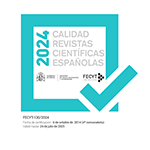La polivalencia de Germánico en "Fasti"
Resumen
La clasificación genérica de Fasti de Ovidio es un asunto muy debatido por la crítica a raíz de la convivencia de elementos propios de distintos códigos literarios en el texto tales como la elegía, la poesía didáctica y la épica. Dado que este poema parece definirse a partir de la indefinición misma, vale pensarlo como una suerte de híbrido textual. A este respecto, la figura de Germánico, dedicatario del poema y partícipe relevante de dos elegías del exilio (Ex Ponto 2.1 y 4.8), se construye como un personaje propiamente dicho que da cuenta de esta hibridez o mixtura. La configuración del personaje de Germánico como hombre de letras, de armas y de poder exhibe la combinación de diversos elementos genéricos y lo vincula con distintos aspectos propios del texto. Nos proponemos demostrar que la caracterización plurivalente de Germánico en Fasti remite, desde un punto de vista metapoético, a la configuración genérica del poema ovidiano.Descargas
Descarga artículo
Licencia
La revista Cuadernos de Filología Clásica. Estudios Latinos, para fomentar el intercambio global del conocimiento, facilita el acceso sin restricciones a sus contenidos desde el momento de su publicación en la presente edición electrónica, y por eso es una revista de acceso abierto. Los originales publicados en esta revista son propiedad de la Universidad Complutense de Madrid y es obligatorio citar su procedencia en cualquier reproducción total o parcial. Todos los contenidos se distribuyen bajo una licencia de uso y distribución Creative Commons Reconocimiento 4.0 (CC BY 4.0). Esta circunstancia ha de hacerse constar expresamente de esta forma cuando sea necesario. Puede consultar la versión informativa y el texto legal de la licencia.








